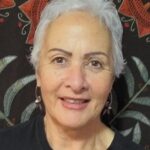
He ara pūkenga, he ara tauwhiro, hei whakamana mātā waka
The many pathways to knowledge, the many pathways of social work, upholding the dignity of all
The Chief Advisor Social Work, Catherine Hughes along with the SWRB is delighted to announce that Carole Adamson and Shirley Ikkala have been appointed as Kaiwhakahaere to co-lead the SWRB’s review of its Programme Recognition Standards.
They bring with them enormously valuable experience and sector knowledge to take forward this important review.

Carole Adamson has had a wide-ranging involvement in social work education in Aotearoa since 1993, as a senior lecturer at Massey and The University of Auckland, in the allied mental health programme at AUT, as Chair and a past executive member of the Council for Social Work Education Aotearoa New Zealand (CSWEANZ), and in current roles as an NZQA monitor for four social work programmes. She currently has academic and practice supervision roles, is a registered social worker, and was engaged as an assessor for the CPD Audit for SWRB in 2020-2021.

Shirley Ikkala of Ngāti Whātua Orakei and Cook Island whakapapa. Her work experience has been predominately in the fields of statutory social work, with a particular focus on tamariki Māori and whānau and is a registered social worker. Within the last 10 + years her social work career has broadened taking her into social work education and she holds the position of Programme Director/Tātarariki in the faculty of Education and Social Work at the University of Auckland. She has held roles as an NZQA external monitor for several tertiary providers of social work. Shirley is actively involved with her iwi and is a director of Whai Maia that is responsible for the social and cultural development of Ngāti Whātuā Ōrakei whanau, apointed to Te Tauamata as representative to the Royal Commission of inquiry into state and faith abuse, member of the organising committee for the coming 6th Indigenous Voices in Social Work conference hosted by Aotearoa.
Their appointment was confirmed following an expression of interest process, and further roles supporting the review will be announced soon.
He Arapaki – Our approach for the review
For the current review of the PRS, we are committed to a process of sector engagement underpinned by the principles and structure of He Arapaki, The SWRB Māori Development Strategy and Action Plan. He Arapaki is informed by our whakataukī – He ara Pūkenga, He Ara Tauwhiro, Hei Whakamana Mātā Waka – and its core values of Matatika, Manaaki, Mahitahi and Māia.
As Kaiwhakahaere, Shirly and Carole represent tangata whenua and tangata tiriti. They will co-lead the review working with the Catherine and the broader SWRB review team. Additionally, there will be engagement with a tangata whenua rōpu, the SWRB Kāhui Māori, who will all be integral to the development of advice to the SWRB Board, and a diverse subject matter/reference rōpu to ensure the voices of Pacific peoples and diverse cultural groups are heard throughout the review.
Six wānanga are scheduled, based around the existing six standards of governance, curriculum, field education, admission criteria, professional and stakeholder collaboration, and staffing resources. The six existing standards are a starting point for the review, and subject to the wānanga, these may change for the future standards.
We are inviting volunteer partners and sector interest groups including iwi providers and educators, social work representative groups, key employers, all other educators, akonga/tauira, and recent graduates to participate in the wānanga alongside individuals and organisations who have already expressed an interest in being involved.
Shirley and Carole comment: “This is an exciting project for us to be involved in as it is an opportunity to develop programme recognition standards reflective of current educational, programme and curriculum developments, and a set of standards that will reflect active Tiriti-based partnerships between social work profession and the SWRB.”

